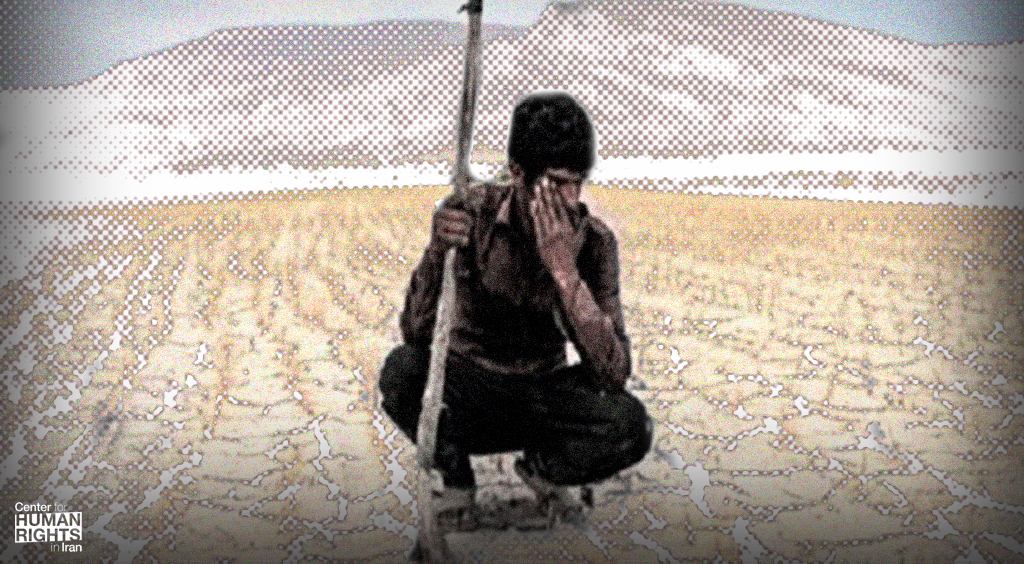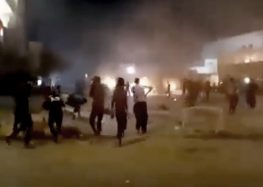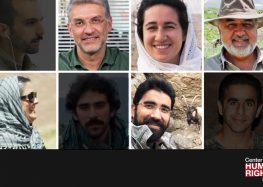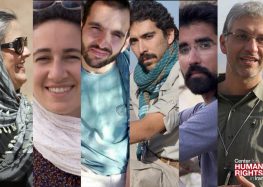Iran Narrows in on Repressing Farmers’ Protests as Water Crisis Spreads

Protests by hard-hit farmers over Iran’s worsening water crisis are being repressed by state security forces as officials increasingly describe the protests as a “national security” issue.
Environmental scientist Kaveh Madani explained in an interview with the Center for Human Rights in Iran (CHRI) that a major portion of the Iranian population “has become directly dependent on water for its livelihood,” and that protests will increase if the government does not provide alternatives for the losses of water-related jobs.
“When there are no alternative jobs for those hit by the water shortages, and the government is unable to take back water and land rights granted to farmers, we will obviously witness more joblessness, discontent, friction, and confrontation,” said Madani, a Yale Senior Fellow who previously served as the Deputy Head of Iran’s Department of Environment.
“Bankruptcy in water management is exacerbated by official decisions that are making matters worse,” he added.
Madani pointed out that the government’s creation of the Supreme Water Council in the early 2000s indicate that state officials were long aware of the crisis.
“However,” he added, “It takes a long time for decisions to turn into action, which inevitably causes problems to pile up that are impossible to fix with piecemeal treatments.”
New Bill Causes Friction Over Diversion of Water Resources
Years of drought and decreasing rainfall amid failed policies and government mismanagement have destroyed much of Iran’s water resources.
“From December 21, 2020, up to March 20, 2021, we had our worst period in terms of rainfall in the past 52 years,” said Ghasem Taghizadeh Khamesi on April 22, 2021. “We might even experience the worst drought in our history this year.”
He added that water reservoirs supplying the country’s dams were at 50 percent capacity, down from 74 percent last year.
As the greatest consumers of water resources, farmers have been hardest hit by the drought.
According to the latest report by the International Alliance in Support of Workers in Iran (IASWI), an independent non-partisan organization, farmers held 91 protests and rallies in the previous Iranian calendar year of 1399, which ended on March 20, 2021.
In January 2021, the Energy Ministry published its Water Bill, which is expected to be submitted to Parliament in May 2021 and has been criticized for failing to incorporate expert analysis and advice.
Some experts have suggested that the bill, which diverts water resources from region to region, was designed to prevent further protests by farmers, especially in the western and southwestern regions of the country—at the expense of the supplying provinces that could soon see their own water rations reduced.
“In order to stop the water protests and cut off water access in provinces in the Zagros Mountains region, some of the agencies under the Energy Ministry have drafted a Water Bill without consulting any experts in this field,” complained Mehdi Pajouhesh, a member of the Water Preservation Committee in Charmahal and Bakhtiari Province, on May 12, 2021.
Diversion of water resources to the country’s drier provinces, such as Isfahan, Yazd, and Kerman, due to increased demand from industrial expansions has also been a major source of contention.
“In reality, the bill has been unfairly drafted in favor of provinces in the desert regions,” he added. “They want to push it through Parliament in order to suppress objections from provinces in the Zagros Mountains region. In other words, it’s a one-sided affair.”
Protesting Farmers Painted as National Security Threat
State officials’ references to the protests using terms such as “water wars” indicates the government is increasingly presenting the protests to the public as a national security threat.
“A war has broken out over water between Isfahan, Charmahal and Bakhtiari, Yazd, Khuzestan, and Lorestan provinces, and it’s going to spread village to village,” said the head of Iran’s Department of Environment, Vice President Isa Kalantari, in a webinar on May 17, 2021.
“In terms of development, there has only been one policy in the country: plundering our natural resources, including water and soil,” he added. “That’s why our country is in the shape it is today.”
On April 24, 2021, as angry farmers in the province of Isfahan planned a mass demonstration to condemn illegal water use, the city’s prosecutor declared a ban on “any kind of gathering without an official permit to voice demands about agriculture and Zayandeh Rud river.”
A statement from the prosecutor’s office ominously accused farmers of “being taken advantage of by enemy forces and infiltrators trying to push the protests toward their own destructive political objectives” and threatened to “confront elements disturbing public order.”
Article 27 of Iran’s Constitution guarantees the right to peaceful protest and does not require people to obtain a permit: “Public gatherings and marches may be freely held, provided arms are not carried and that they are not detrimental to the fundamental principles of Islam.”
Article 50 meanwhile obligates the government to preserve water resources, “The preservation of the environment, in which the present, as well as the future generations, have a right to flourishing social existence, is regarded as a public duty in the Islamic Republic. Economic and other activities that inevitably involve pollution of the environment or cause irreparable damage to it are therefore forbidden.”
Disputes between provinces have been brewing for years as the drier provinces desperately urge for more water resources.
In October and November 2018, hundreds of farmers camped on the outskirts of Isfahan for more than 40 days to protest governmental mismanagement of water resources in their drought-ridden province.
In the summer of 2018, protests over water shortages took place in several cities in Iran, the most violently repressed occurring in Kazeroon in Fars Province, and Khorramshahrin Khuzestan Province, where shots were fired at protesters, killing at least one farmer in Kazeroon.
In February 2019, Ardeshir Nourian, a member of Parliament from Shahr-e Kord, Chaharmahal and Bakhtiari Province, where disputes over water rights are raging with neighboring provinces, revealed that the Supreme Water Council and the Supreme National Security Council had ordered media outlets to be silent on the issue.
Read this article in Persian.






